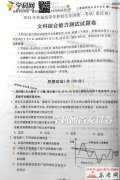2015重庆巴蜀中学三诊英语试题及答案(3)
2015-05-26 08:13:54
He tried to speak, but he couldn’t make out a word.
“I’m sorry, but I can’t understand you,” I said.
With great difficulty he said, “I love you.”
We don’t learn courage from heroes on the evening news. We learn true courage from watching ordinary people rise above hopeless situations. In many ways my father was a strict, uncommunicative man. He found it difficult to show emotion. The bravest thing I ever saw him do was overcome that barrier to open his heart to his son and family at the end of his life.
36. Which of the following statements is TRUE?
A. The writer accompanied his father to a medical examination.
B. The writer was quick to notice the strange condition of his father.
C. The writer’s father got worse after the removal of the brain tumor.
D. The writer’s father had known about his illness before the writer discovered it.
37. What does the underlined sentence “the odds are long” mean?
A. It takes a long time for father to recover.
B. Father needs love and care from his family.
C. There’s little possibility for father to recover.
D. They need a proper time to operate on father.
38. The father had never said “I love you” to the writer before because ________.
A. he was not used to openly showing his emotions
B. he thought there was no need to tell the writer
C. he believed in strictness and punishment
D. he was not so attached to the writer
39. What does the writer attempt to tell us?
A. Life is short, so live your life to the fullest.
B. Don’t wait to see a doctor till it is too late.
C. Bravely express your love for your family.
D. We don’t often value health until we lose it.
B
Hello Tommy,
We’re getting really excited about the Understanding IELTS: Techniques for English Language Tests course, which is starting next week!
So far more than 76,000 people have signed up and more and more are joining every day, so we will be a big group doing the course together.
The course will consist of a variety of videos, language activities and explanations, discussions and quizzes. In the first week, we will look at exams in general and talk about how you feel about them. Then each week we’ll focus on a different aspect of the IELTS test (Reading, Listening, Writing and Speaking), and you’ll have the chance to share your opinions about each topic and compare them with those of your fellow learners around the world.
Getting ready for the course
If you want to prepare for the course over the next week, you can go the British Counci’s Take IELTS website to find out more about the test.
Booking a test
If you’re already thinking of booking an IELTS test date, you can book online here.
Tell your friends
Remember, you can invite friends and colleagues to join the course and take part with you. Learning with people you know can really enrich the experience of studying online. Your friends and colleagues can join the course by visiting this page: futureLearn.com/ courses/ understanding - ielts
There will be lots of opportunities to interact with other learners once the course starts. Before then, you can use the hashtag#FLEnglishIELTS to discuss the course on social networks.
The course begins on Monday, 11 May 2015 and we will send a welcome note as soon as we have started. If you have any questions or feedback before the course starts, I won’t be able to answer you personally, but please look at FutureLear’s help pages.
Best wishes,
Chris Cavey
Lead educator
British Council
40. How many people may attend the course when it starts on 11 May 2015?
A. 74,000 B. 75,000 C. 76,000 D. 77,000
41. What will Tommy do in the first week if he chooses the Understanding IELTS?
A. express his impressions of the IELTS test.
B. devote to a different aspect of the IELTS test.
C. possess the chance to talk about his opinions.
D. compare his opinions with those of your fellow learners around the world.
42. If Kevin, Tommy’s colleagues, wants to join the Understanding IELTS, which website should he visit?
A. futureLearn.com/ courses/ help
B. futureLearn.com/ courses/ book online
C. futurelearn.com/ courses/ understanding-ielts
D. futureLearn.com/ courses/ FLEnglishIELTS
43. What is the purpose of this email?
A. to assist people to communicate with fellow learners better
B. to give people a brief introduction to the Understanding IELTS
C. to improve people’s language skills
D. to instruct people to book the test
C
Look at the keyboard of any standard typewriter or computer. “Q, W, E, R, T” and “Y” are the first six letters. Who decided on this arrangement of the letters? And why?
People tried for centuries to invent the typewriter. In 1714 in England, Henry Mill filed a patent for a machine called An Artificial Machine Or Method for the Impressing or Transcribing of Letters, Singly or Progressively one after another, as in Writing, whereby all Writing whatever may be Engrossed in Paper or Parchment so Neat and Exact as not to be distinguished from Print. That machine probably didn’t sell because no one could remember its name!
The first practical typewriter was patented in the United States in 1868 by Christopher Latham Sholes. His machine was known as the type-writer. It had a movable carriage, a lever (杆) for turning paper from line to line, and a keyboard on which the letters were arranged in alphabetical order.





